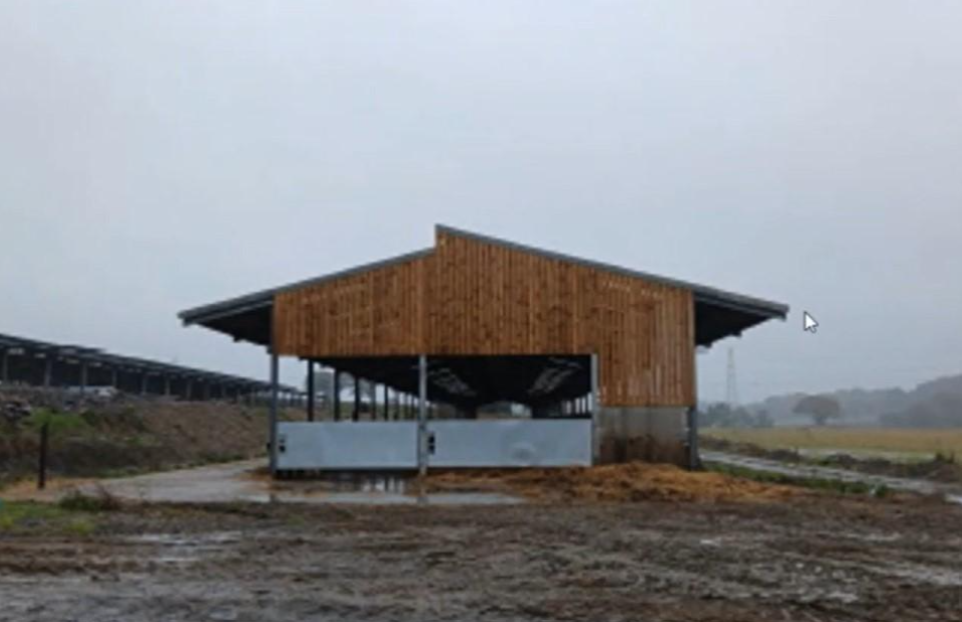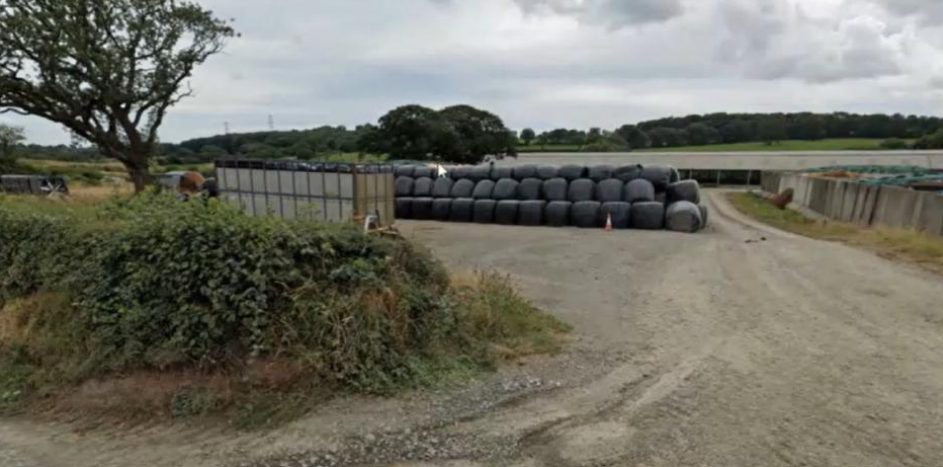Business
Council considering enforcement action against unauthorised wedding venue

BUSINESSMAN Rhys Owain Lloyd, and his partner Carys Elin Mair Davies have found themselves at the centre of controversy in recent days.
Their operations at Redberth Gardens in Pembrokeshire, where they are running an unauthorised wedding tipi venue, have caught the ire of local authorities and residents alike.
Now the council is considering formal enforcement action, it has been confirmed.
Despite being denied planning permission by Pembrokeshire County Council on April 23, the couple has forged ahead with their venture.
Weddings have already taken place at the venue on May 25, with another booked for June, locals said. Lloyd and Davies, both from Carmarthen, are brazenly advertising and accepting payments for weddings and music events under the guise of Serenity Garden, even though they lack the necessary wedding licence.
The properties they advertise for accommodation—safari tents and glamping pods—do not have the requisite planning permission. Furthermore, the lodges have not been signed off by building regulations, raising serious concerns about their ability to secure insurance for guests.
As if these infractions weren’t enough, ceremonies are conducted on a site not listed on PCC’s approved venue list. Adding another layer of complexity, the land used for these ceremonies is designated as a Site of Special Scientific Interest (SSSI) and is under investigation by National Resources Wales due to allegations of land grabbing from a local farmer, which has ignited a legal dispute.
Pembrokeshire County Council responded to the situation with a series of statements sent to the Pembrokeshire Herald by email.

Regarding planning issues, a council spokesperson said, “The planning application was submitted retrospectively following a planning enforcement investigation. The refusal of the application means we are considering formal enforcement action to remedy the breach of planning control.”
The council also noted that a separate planning application for an extension to the holiday accommodation, comprising three glamping pods and six safari tents, was withdrawn in May. “An indication was given that a revised application would be resubmitted,” the spokesperson added.
In terms of marriage ceremonies, the council explained, “The venue applied to become licensed as an approved premise for ceremonies some months ago. As part of the licensing procedure, we require proof of planning and event consent. Neither of these were provided with the application, so we have proceeded no further, pending receipt of these documents.”
The council is aware that the venue continues to take bookings. “Any ceremonies currently taking place are not legal ceremonies or undertaken by the Registration Service; instead, they are non-legal ceremonies conducted by independent celebrants,” the spokesperson clarified.
The saga of Rhys Owain Lloyd and Carys Elin Mair Davies at Redberth Gardens is a stark reminder of the ongoing issues with unauthorised venues and the difficulties faced by local authorities in enforcing planning regulations and ensuring public safety. As this story unfolds, the community watches closely, awaiting the next move in this contentious drama.
Although there is no wedding licence, the council have confirmed that there is a current premises licence issued under The Licensing Act 2003 for the venue, authorising the sale of alcohol and regulated entertainment.
The Herald has tried to contact the business owners for comment.
Business
Computer Solutions Wales under fire from customers

Claims of unreturned devices, unpaid refunds and small claims court cases as company blames landlord dispute
CUSTOMERS across west Wales have raised concerns about the trading activities of Computer Solutions Wales, alleging unpaid refunds, missing computers and prolonged periods of poor communication.
The Herald has spoken to several individuals who say they handed over laptops or desktop computers for repair or replacement, paid hundreds or in some cases thousands of pounds, and were then left without their property or a refund despite repeated attempts to resolve the matter.
In some cases, those affected say they have pursued the issue through the civil courts.
Court action taken
Zac Townley said he handed over two custom-built desktop PCs for repair on Sunday (Mar 30, 2025) and later paid £710 after being told the work was complete. He says the computers were never returned.
After months of chasing, Mr Townley took the matter to court. A hearing took place in October 2025, which he says the defendant did not attend. The court ruled in his favour and issued an order in November for the return of the two computers and repayment of £377 in court fees.
He says that deadline has since passed and the computers remain outstanding.
Other customers described similar experiences, including payments for repairs or replacement equipment followed by delays, cancelled appointments and repeated assurances that items would be returned or refunds processed.
Several said they were eventually advised to pursue claims through the small claims court.
One former worker also alleged unpaid wages during a period of employment.
The Herald has seen copies of text messages, payment confirmations and court paperwork relating to some of the complaints.
Company status questions
Companies House records show that Computer Solutions Pembs Ltd, the limited company associated with the business, was dissolved on Tuesday (July 29, 2025) following compulsory strike-off proceedings.
Filings show changes to directors and persons with significant control in the months before dissolution, along with a change of registered office address outside Wales.
Under company law, a dissolved limited company cannot trade or enter into new contracts.
Despite this, services continued to be advertised online under the Computer Solutions Wales name, including through a website and social media pages. Some customers told The Herald they believed they were dealing with an active limited company at the time they made payments.
Trading history
Archived photographs, marketing material and social media posts seen by The Herald show the Computer Solutions Wales name has been used publicly for several years, including from a high street premises in Pembrokeshire and in promotional material dating back to 2022.
Customers said they understood Computer Solutions Wales to be an established local business operating under the same branding throughout that period.
Police response
Dyfed-Powys Police confirmed they had reviewed information provided to them about the complaints.
In correspondence seen by The Pembrokeshire Herald, police said the matters raised did not constitute a criminal investigation and appeared to relate to civil liability and potential consumer protection issues. Complainants were advised to contact Trading Standards and pursue enforcement through the civil courts where appropriate.

Company response
Steven Grant, trading as Computer Solutions Wales, was contacted and offered the opportunity to comment. Publication of this article was delayed by one week to allow time for a response.
In a written holding statement, a spokesperson for the business said the issues stemmed from a dispute with a former landlord.
The statement said: “This issue began when Computer Solutions Wales was in dispute with its then landlord over building repair obligations and subsequent rent requirements.
“Since then, the landlord has denied CSW access to the property which contains a number of computers. These computers do not belong to CSW nor the landlord, but to CSW customers.
“CSW does not understand the legal position regarding ‘ownership’ of these computers, and is urgently seeking legal advice as to how the computers can be returned to their rightful owners at the earliest opportunity.
“CSW fully understands the frustration of its customers, and can reassure them that it is making strenuous efforts to resolve this matter as soon as is possible.”
The Herald asked Mr Grant to clarify several points arising from this explanation, including why customers were not kept informed during the alleged access dispute, how long access to the premises had been restricted, how many customer devices remained at the property, whether customers had been formally notified in writing, and the name of the landlord or managing agent so the circumstances could be independently verified.
He replied that he was travelling and had no further comment beyond the statement already provided.
Business
Port backs next generation of seafarers with expanded cadetship support

STUDENTS training for careers at sea in Pembrokeshire are set to benefit from enhanced practical learning after fresh backing from the Port of Milford Haven.
Learners on the Marine Engineering Pre-Cadetship at Pembrokeshire College will now receive additional hands-on maritime training, funded by the Port, alongside their classroom studies.
Launched in 2023, the enhanced programme is aimed at young people hoping to enter the maritime, deck and engineering sectors. It combines technical teaching with industry-focused skills to help students prepare for work at sea.
For the past three years, the Port has covered the cost of uniforms to encourage professionalism and team spirit among cadets. This year, its support has been widened to include a series of accredited practical courses delivered through the Royal Yachting Association.
These include radar operations, first aid training for mariners, navigation and seamanship, and professional practices and responsibilities — qualifications designed to give students recognised safety and operational skills before entering the industry.
Brian Stewart, Assistant Harbourmaster at the Port of Milford Haven, said the training provides valuable real-world preparation.
He said: “The Pre-Cadetship training at Pembrokeshire College gives students a real insight into life in the maritime, deck and engineering sectors, while building key qualities such as discipline and teamwork. It’s great to see these enhanced practical opportunities being offered this year, which will provide students with invaluable experience and a clearer pathway into our diverse industry.”
Tim Berry, maritime lecturer in the college’s Faculty of Engineering and Computing, said the extra funding would make a “tangible difference” to learners.
He added: “These RYA-accredited practical courses allow the Pre-Cadets to translate classroom theory into real maritime skills, building their confidence and readiness for a career at sea. We’re incredibly proud of the opportunities this partnership continues to create for the next generation of marine engineers.”
The Port, one of the county’s largest employers, has increasingly worked with local education providers to encourage young people into maritime and energy-related careers, helping retain skills and opportunities within Pembrokeshire.
More information about the Marine Engineering Pre-Cadetship is available at pembrokeshire.ac.uk.
Cover photo:
Pre-Cadetship students with lecturer Tim Berry and Port of Milford Haven representatives Brian Stewart and Emily Jones (Pic supplied).
Business
Langdon Mill Farm Pembrokeshire expansion signed off

THE FINAL sign-off for plans for a heifer accommodation building and associated works at one of Pembrokeshire’s largest dairy farms, with a milking herd of 2,000 cows, have been given the go-ahead.
In an application backed by councillors at the December meeting of Pembrokeshire County Council’s planning committee, Hugh James of Langdon Mill Farms Ltd sought permission for a 160-metre-long heifer accommodation building, a slurry separation/dewatering building and associated yard areas at 1,215-hectare Langdon Mill Farm, near Jeffreyston, Kilgetty.
A supporting statement through agent Reading Agricultural Consultants said: “The holding currently has a milking herd of approximately 2,000 cows, which are housed indoors for the majority of the year, with dry cows and heifers grazed outdoors when weather and soil conditions permit.

“There has been significant investment in buildings and infrastructure at the farm over the last decade in respect of cattle accommodation, slurry storage, milking facilities, Anaerobic Digestion (AD) plant, feed storage. Recently a calf and weaned calf accommodation buildings were approved by Pembrokeshire County Council with construction almost complete.
“The unit is efficient, achieving yields of more than 10,000 litres/cow/year, with cows being milked three times/day in the 60-point rotary parlour. Langdon Mill Farm currently directly employs 21 full-time, and three part-time staff. Of these, four live on site in the two dwellings opposite the farm, with the remaining staff living in the locality.”
It added: “Although the unit has previously purchased heifers to aid expansion, the farm now breeds most of its own replacements to improve genetics and to minimise the ongoing threat of bovine tuberculosis (bTB).”
It said the proposed building would be used by heifers between the ages of 7-22 months, the siting “directly influenced by the adjacent calf and weaned calf buildings, with livestock being moved from one building to the next as they get older”.
Members unanimously supported the recommendation of approval, giving delegated powers to the interim head of planning to approve the application following the final approval of a habitats regulations assessment.
An officer report published yesterday, February 5, said Natural Resources Wales confirmed it had received the assessment, and, “in consideration of the mitigation measures detailed and on the understanding there is no increase in stock, they agree with the LPA’s conclusion that an adverse effect upon the integrity of the SAC [Special Areas of Conservation] sites can be ruled out”.
Formal delegated approval has now been granted by officers.
-

 Health4 days ago
Health4 days agoHealth board targets rise in steroid and gym drug use across west Wales
-

 Crime5 days ago
Crime5 days agoSex offender jailed after living off grid in Pembrokeshire and refusing to register
-

 News6 days ago
News6 days agoPrincess of Wales visits historic Pembrokeshire woollen mill
-

 Crime4 days ago
Crime4 days agoTeacher injured and teenager arrested for attempted murder at Milford Haven School
-

 Crime6 days ago
Crime6 days agoHakin man’s appeal delayed again as Crown Court seeks guidance on insurance law
-

 Crime7 days ago
Crime7 days agoArrest made after Carmarthen park stabbing investigation
-

 Crime7 days ago
Crime7 days agoMan guilty of threatening to kill Herald editor
-

 Crime5 days ago
Crime5 days agoJohnston man remanded in custody over knife and assault charges


























